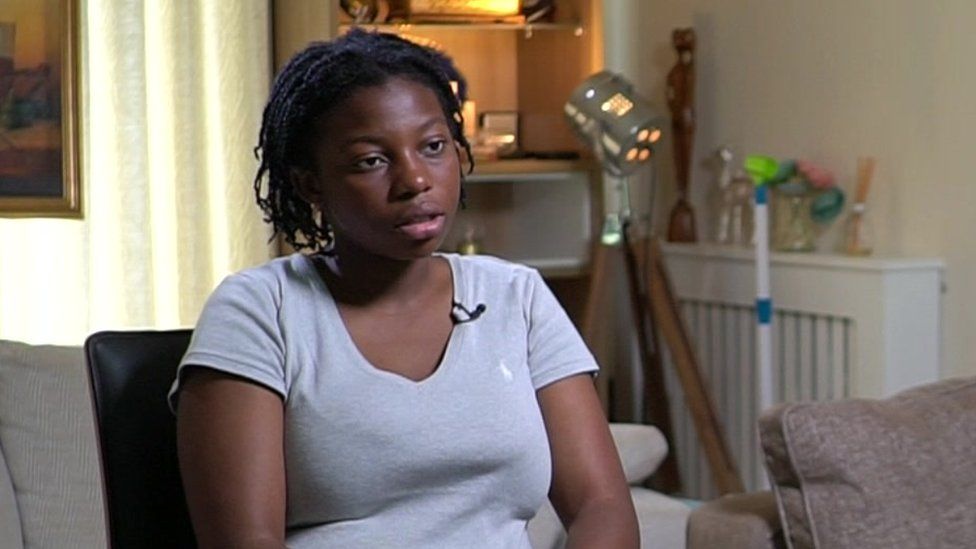
A toxic culture of sexual assault, harassment, racism and bullying has been alleged by more than 100 current and recent UK staff at outlets of the fast-food chain McDonald’s.
The BBC was told that workers, some as young as 17, are being groped and harassed almost routinely.
The UK equality watchdog said it was “concerned” by the BBC’s findings and is launching a new email hotline.
McDonald’s said it had “fallen short” and it “deeply apologised”.
It added that all employees deserved to work in a safe, respectful and inclusive workplace.
The BBC began investigating working conditions at McDonald’s in February, after the company signed a legally binding agreement with the Equality and Human Rights Commission (EHRC) in which it pledged to protect its staff from sexual harassment.
At the time, McDonald’s insisted: “We already have a strong track record in this area.”
But our investigation has revealed a very different picture.
Of the more than 100 allegations from employees we spoke to, 31 related to sexual assault, and 78 related to sexual harassment.
We also heard 18 allegations of racism, while six people made allegations of homophobia.
Warning – this article contains distressing content
Claims the BBC has heard include:
- A 17-year-old current employee in Cheshire who says a colleague 20 years older than her called her a racial slur word and asked to show her his penis, and said he wanted to make a “black and white” baby with her
- A former worker who was 17 when a senior manager at a Plymouth restaurant choked her and grabbed her bottom. A shift manager also sent her sexually explicit images
- A manager in Hampshire who suggested a 16-year-old male worker perform sexual acts in exchange for vapes
- A manager who preyed on 16-year-old new female starters in a Cheshire restaurant, trying to pressurise them into having sex
- A woman who said she was called a slur word and subject to racist jokes at an Aberdeen branch
- A current worker in Essex who says she faced anti-Semitic abuse
- A current worker in Oxfordshire, originally from India, who says crew members spoke in “gibberish” to imitate her and called a Pakistani colleague a terrorist
- Male managers and crew members at a branch in Wales making jokes about putting cash bets on which of them could sleep with a new recruit first
- An outbreak of gonorrhoea at a branch in Northern Ireland where sexual relationships between staff members were commonplace
Multiple workers told us that McDonald’s managers at the outlets across the UK were responsible for the harassment and assaults.
All too often, senior managers are said to have failed to act on complaints.
Staff have also told the BBC of sexual relationships between managers and more junior members of staff, which is against company policy.
Young women have described feeling constantly judged about how they looked.
One current worker said she was seen by her male colleagues as “fresh meat” when she started at her branch in Nottingham. Other female workers told us they were forced by managers to wear uniforms that were too tight for them.
“There is a saying at McDonald’s, “tits on tills” – boys in the kitchen, girls on the counter. The idea is to put attractive people at the front,” said Lucy, who’s 22 and worked in Norwich.
“It’s the expectation that if you work at McDonald’s, you will be harassed,” added Emily, who’s 20. She left her branch in Brighton last year, after a male colleague in his 60s kept stroking her hair in a sexually suggestive way and making her feel uncomfortable.
McDonald’s is one of the UK’s largest private sector employers. The fast food giant has more than 170,000 people working in 1,450 restaurants.
Its staff are also one of the country’s youngest workforces. Three quarters of its employees are aged between 16 and 25. For many, it is their first job.
Most workers are not directly employed by the company as McDonald’s uses a franchise system, which means individual operators are licensed to run the outlets and employ the staff.
‘I went to work in fear’
Shelby was just 16 when she started working at a McDonald’s restaurant in Berkshire last year.
She said older male colleagues would use the cramped layout in the kitchen as an excuse to touch junior female staff inappropriately.
“They’d grope stomach, waists, bums,” she said. “Every shift I worked, there would be at least a comment being made, or I’d be brushed, a hand brushed across me, or it would be a more severe thing, like having my bum grabbed, hips grabbed.”
This video can not be played
To play this video you need to enable JavaScript in your browser.
There was one man in his 50s, in particular, that managers “warned” young staff members to stay away from, Shelby said.
One day last summer, she said she was standing at the front counter when he came up behind her and grabbed her onto him, pulling her onto his groin.
“I just froze,” she said. “I felt disgusted.”
Shelby says she told senior management about what was going on in the store, but nothing was done. In her resignation email, she said it was a “toxic work environment”.
McDonald’s said it was “deeply sorry” to hear about what Shelby went through. It added that it was investigating why any issues that she raised were not formally escalated at the time.
Managers turning a blind eye
A number of the workers we spoke to said that, like Shelby, they reported harassment and assault, only for it to be ignored.

In the case of 17-year-old Chinyere in Cheshire, who was sexually and racially harassed by a much older man, she initially raised it with a female colleague who was responsible for staff wellbeing. She told her to ignore the man’s behaviour and go back to work. After months of harassment, Chinyere confided in her stepfather who wrote to the franchise, to corporate headquarters and the police.
The man was then fired. Chinyere believes if her stepfather hadn’t intervened, nothing would have happened. McDonald’s described her experiences as “abhorrent and unacceptable” and apologised unreservedly. It said it took swift action as soon as the issue came to its attention and that the man was dismissed within three days. They added: “It takes a great deal of courage to speak up and as soon as we were made aware of the situation the individual in question was offered both internal and independent external support.”
Another worker in Birmingham, who says she was smacked on the bottom by a male colleague when she was 19, reported it immediately to her manager. But despite it being caught on camera and her having a visible bruise, she was forced to continue working with him, which made her so uncomfortable that she eventually quit.
Several workers also said that when complaints were made about managers, they were then moved from one McDonald’s restaurant within the franchise to another, rather than being fired.
Other employees said they didn’t complain as they couldn’t risk losing work. Young staff at McDonald’s are often on zero hours contracts – it means their hours are flexible, but also that they are at the mercy of shift managers who decide their rotas.

What to do if you have been sexually harassed at work
- Report it: Charity Victim Support says you can report it to your manager, HR representative or trade union who will take action.
- Keep a record: Including dates, times and details of what happened, as well as any relevant emails. These could be helpful if you decide to report it.
- Get help: Victim Support operates a free and confidential 24/7 helpline and live chat service. Call 0808 16 89 111 or use the live chat at: victimsupport.org.uk/live-chat.
- Call the police: If sexual harassment escalates into violence, threats or sexual assault, you should report this to the police by calling 101. If you are in danger, call 999.

Training ‘not taken seriously’
In the February agreement, McDonald’s pledged “zero tolerance” on sexual harassment and to deliver training for employees.
But staff have told the BBC the training is not being taken seriously by managers.
One employee described perching an iPad next to a McFlurry machine and speeding through the harassment training video while he made drinks.
Baroness Kishwer Falkner, chairwoman of the EHRC, said every firm should have zero tolerance of sexual harassment and protect its workforce.
McDonald’s culture has faced scrutiny globally. In the US it is facing multimillion dollar lawsuits brought by employees over sexual harassment allegations.
Its chief executive, Steve Easterbrook, was fired in 2019 after it was revealed he had inappropriate consensual relationships with McDonald’s employees.
Allegations of sexual harassment at McDonald’s first surfaced in the UK five years ago when the Bakers, Food and Allied Workers Union (BFAWU) says it received 1,000 complaints. There was very little reporting of the allegations at the time – this could be because some cases were settled using confidentiality clauses.
Sarah Woolley, BFAWU’s general secretary, said the new allegations uncovered by the BBC were “shocking”.
Alistair Macrow, chief executive of McDonald’s UK & Ireland, said there was “simply no place for harassment, abuse, or discrimination” at the company.
“Every one of the 177,000 employees in McDonald’s UK deserves to work in a safe, respectful and inclusive workplace. There are clearly instances where we have fallen short and for that we deeply apologise,” he told the BBC.
“We will investigate all allegations brought to us, and all proven breaches of our code of conduct will be met with the most severe measures we can legally impose, up to and including dismissal.”
Mr Macrow said that more than 2,000 managers had completed full awareness training and that most restaurant teams were now working within the new protections which aim to create “a safe and respectful workplace”. He added that the company has stringent rules to ensure its workplaces around the world are safe and respectful.

Have you been affected by issues covered in this story? You can share your experiences by emailing haveyoursay@bbc.co.uk.
Please include a contact number if you are willing to speak to a BBC journalist. You can also get in touch in the following ways:
- WhatsApp: +44 7756 165803
- Tweet: @BBC_HaveYourSay
- Upload pictures or video
- Please read our terms & conditions and privacy policy
If you are reading this page and can’t see the form you will need to visit the mobile version of the BBC website to submit your question or comment or you can email us at HaveYourSay@bbc.co.uk. Please include your name, age and location with any submission.
If you have been affected by any of the issues in this story, information and support is available via the BBC Action Line.
Some of the names in this story have been changed to protect identities.
Additional reporting by George Dabby.




